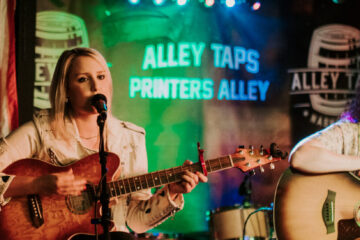Today, I am going to discuss commercial songwriting versus non-commercial songwriting. I want to emphasize that this blog is entirely based on personal opinions, and there may be varying perspectives on this topic. I simply aim to share my thoughts on the challenges of commercial songwriting and what that concept signifies for me as a songwriter. Keep in mind that these insights may resonate with you or may not – it is all part of the diverse world of songwriting perspectives! With that being said, lets dive in!
What is Commercial Songwriting?
Commercial songwriting typically refers to the creation of music with the intent of making it commercially successful. This often involves tailoring the music to fit current trends, appealing to a wide audience, and meeting the standards of the music industry. Commercial songwriters may work with artists, producers, and labels to create music that has mass appeal and is likely to generate sales or streaming revenue. Success in commercial songwriting is often measured by chart performance, radio play, and financial returns.
What is Non-Commercial Songwriting
Non-commercial songwriting, on the other hand, may prioritize artistic expression and creativity over commercial viability. Songwriters in this category may create music for personal satisfaction, to convey a message, or as a form of self-expression. Non-commercial songwriting can span a wide range of genres and styles, and the primary goal may not be financial success or mainstream popularity. Some songwriters in this category may choose to remain independent and release their music through alternative channels, such as independent labels or online platforms such as Spotify, Pandora, Apple Music, Sound Cloud, etc.
Commercial Vs. Non-Commercial
It is important to note that these distinctions are not absolute, and there is often a considerable amount of overlap between commercial and non-commercial songwriting. Many successful artists and songwriters find a balance between commercial considerations and artistic integrity. Ultimately, the choice between commercial and non-commercial songwriting depends on the goals and priorities of the songwriter. Some may aim for widespread recognition and financial success, while others may prioritize creative expression and authenticity, even if it means a smaller audience.
Even if you choose to write non-commercially, the influence of online trends and platforms like TikTok, which prioritize content based on algorithms, can unexpectedly propel your non-commercial content into viral status, potentially generating profit. For me, the distinction between commercial and non-commercial songwriting boils down to intent and mindset. Commercial songwriting involves deliberately adhering to current trends, guided by industry guidelines and research. On the other hand, non-commercial writing is fueled by personal creative impulses, without the considerations of industry trends and online algorithms.
Nevertheless, some artists establish their careers through commercial writing and later leverage their loyal fan base to explore non-commercial avenues. This shift can be successful if the artist’s reputation precedes the deviation from their known genre. Fans may embrace the non-commercial work because of their loyalty to the artist, a scenario less likely for an unknown artist initially focused on non-commercial music. However, success is unpredictable. For example, a well-known country artist like Morgan Wallen attempting a heavy metal album might face backlash, as it deviates too sharply from the expectations of their typical fan base. Genre consistency is crucial, yet, despite meticulous efforts, songwriting success remains unpredictable. There are many elements that go into the success of songwriters and no matter how calculated the attempts are, you could still have a hit song flop and a non-commercial song drive success!
Personal Experience
I have been a songwriter since I was six years old. I am from Greenville, North Carolina, so growing up, the distinction between commercial and non-commercial songwriting was foreign to me. It was all just about expressing myself through music. It wasn’t until I moved to Nashville and enrolled at Belmont University that I learned about the strategic aspects of songwriting.
Personally, I choose to write more non-commercially. I play by ear so I usually write songs based off of the emotions I am currently feeling or the melody I create on guitar and piano. I use songwriting as an outlet, so I have songs that may sound more country or pop, and some that have more rock or jazz elements. I have grown a lot as a musician over the years, and recently I am discovering my image as an artist and fitting into my style.
Over the years, defining my musical identity was challenging. When asked about my musical style, I used to struggle to categorize it into a specific genre. However, as I have evolved as a musician, I find myself gravitating towards an edgy folk country sound. Yet, I still retain the flexibility to explore multiple genre influences, guided by the creative energy that moves me at any given moment. While I have recently ventured into more commercial songwriting, I make a conscious effort to infuse each composition with my unique perspective. Even in commercial projects, I believe it is crucial to maintain elements of authenticity and ensure my individuality shines through.
Why I choose to write Non-Commercial
I am more drawn to non-commercial songwriting because I resist the notion of someone dictating what I should write about. To me, the beauty of songwriting lies in the freedom to express one’s unique thoughts and raw emotions without imposed rules. Writing becomes challenging when faced with a list of expectations and predefined topics. It feels restrictive and inauthentic compared to those moments when inspiration strikes – whether it’s while cooking, sleeping, or waking up in the middle of the night to jot down lyrics on my phone or a napkin.
For me, the true joy of songwriting lies in capturing the flow of lyrics and melodies that spring organically from my hands to the paper when I’m fueled by my own inspiration and creativity. It is an incredible feeling to create something from my own inspiration rather than conforming to external expectations.
I am a songwriter as a hobby. I do not want to pursue songwriting as a career, so in my case I do not mind writing non-commercially. Songwriting is something I love and I do not want to associate it with a job or a deadline I have to meet. I want songwriting to stay my creative outlet which is why I do not pursue it as a career. For people who are pursuing it as their career, commercial songwriting can be a really great strategy! No matter which choice you make in your songwriting remember to have fun with it and there is always room for creativity!
Let me know your thoughts and questions in my Contact Me form!
Remember to fill out my Follow Me form to stay up to date on current news!
Follow my socials below!


